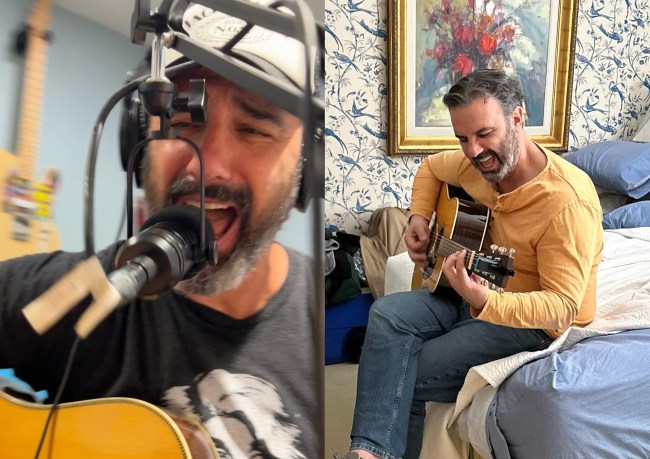via Aaron Perlut
Aaron Perlut, frontman of Atomic Junction, thrives on defying expectations. This is a gentleman who once wore an Alf costume and Borat-esque mankini to help market his friend’s beard balm company—completely unsolicited.
That friend? Me.
These kinds of shenanigans might seem like a whimsical persona, a sort of front of rock star myth-making.
But don’t you dare think Aaron is all shenanigans.
He’s also the guy who received a phone call from Ray Wylie Hubbard, the legendary Texas songwriter of “Snake Farm’ fame, with a casual bombshell: “I heard your new album. It’s really good.”
It was a seismic moment from one of his heroes, and some much-needed validation. “That’s one of the greatest honors of my life,” he admits. “It’s like Ray saw something in our music that aligned with his own storytelling DNA.”
I like to think of Aaron’s journey into music as proof that you’re allowed to have as many creative chapters as you wish in life.
Aaron is one of the early champions of our mission here at BroBible. 14 years ago, Aaron was at the helm of the American Mustache Institute, which called itself “the world’s leading facial hair advocacy organization.” As a bearded man myself, I thought the AMI and its mission were hilarious. So I supported Aaron’s work with gusto, especially when he wrote about great mustachioed men like Burt Reynolds.
Aaron is a veteran marketer and co-founder of a successful St. Louis creative agency. Musically, however, he didn’t pick up a guitar until he was 46. Today, he’s leading Atomic Junction—a band carving out its niche in the crowded Americana space—and discovering the harsh truths and surprising rewards of chasing a creative dream later in life.
But don’t mistake this for a glamorous clout-chasing reinvention story.
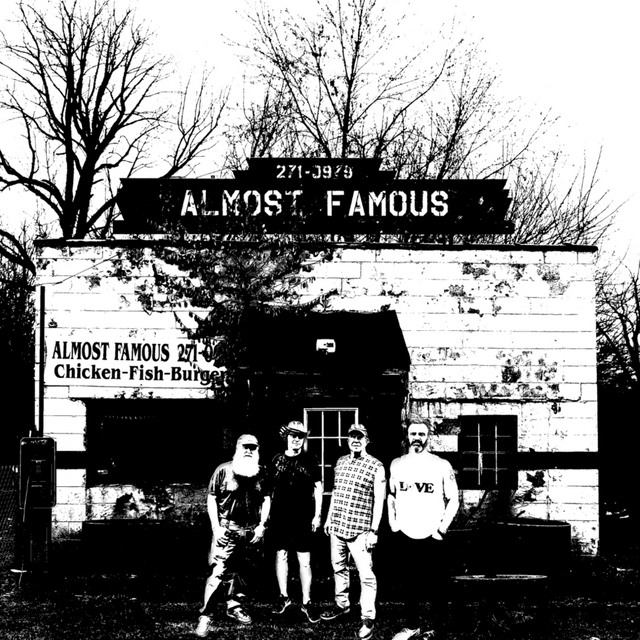
via Atomic Junction
“Paying your dues is real, and it sucks,” Aaron says bluntly. He’s played to empty rooms—just him, the band, and a bartender—and learned to savor the nights when everything clicks. Like in Nashville, where a seasoned musician once told him, “Your musical heritage comes from the same place as mine,” with a knowing nod to Steve Earle.
What I appreciate most about Aaron’s journey is that it’s not about chasing fame or building an image. It’s about doing something you love because it completes you—because it’s who you are, procrastination demons be damned. It’s about proving to yourself, and maybe a little to the world, that dreams don’t have expiration dates. The idea that rock ‘n’ roll belongs only to the young and fashionable is bullsh*t, and the glamour of touring? A total myth.
Aaron’s work with Atomic Junction is an unbearable creative itch that has to be scratched.
The older I get, the more I dig that trait in people. So let me tell you a little more about this guy—and why I adore the hell out of him and the kind of stuff he creates.
Maybe there’s a lesson in here for all of us about knowing yourself and having the big brass cajones to follow where that takes you.
Guilt, Guitars, and A Creative Reboot
Aaron didn’t grow up in a musical household. His love for music started in high school, collecting classic rock albums and tuning into a country station on his car’s AM radio. In 2000, his wife surprised him with his first guitar and a handful of lessons. A few sessions later, life intervened, and the guitar sat untouched for years.
“About seven years ago, I got fed up watching my kids take piano lessons while I wasn’t doing anything,” Aaron recalls.
Even though Aaron regularly contributes to BroBible through his The Load Out music podcast, we haven’t caught up in a while. Earlier this year, I’d told him I’d write something about his new album, Peacedale, which dropped in the summer of 2024. But then life got in the way—creative projects, bandwidth-sucking work stuff, trips, and excuses stacked up faster than I care to admit.
So naturally, when we reconnected, I was ready to make good on that promise.
And then I didn’t.
Because clearly, my guilt needed to marinate for five more months before I finally sat down to do this.
That brings me to the story of how Aaron, in a moment of frustration—watching his kids play piano while his guitar collected dust—decided to pick it up again. This time, he sought guidance from a skilled teacher who had played with Pokey LaFarge. Within months, Aaron was composing music and, not long after, forming a band.
“I was terrible at first,” he admits. But what he lacked in technical skill, he made up for with narrative chops honed over a lifetime of storytelling. “Between my ability to convey a story and my bandmate’s musical expertise, we clicked quickly.”
Initially, Aaron leaned into humor. “We were going to be a comedy, country-rock band, kind of like Wheeler Walker Jr. or Tenacious D,” he explains. The band’s first incarnation was called Atomic Junkshot—a name as cheeky as their early ambitions.
But as the cultural landscape shifted, so did Aaron’s approach. “Comedy today is dramatically different from three or four years ago. What was funny before is no longer funny,” he says.
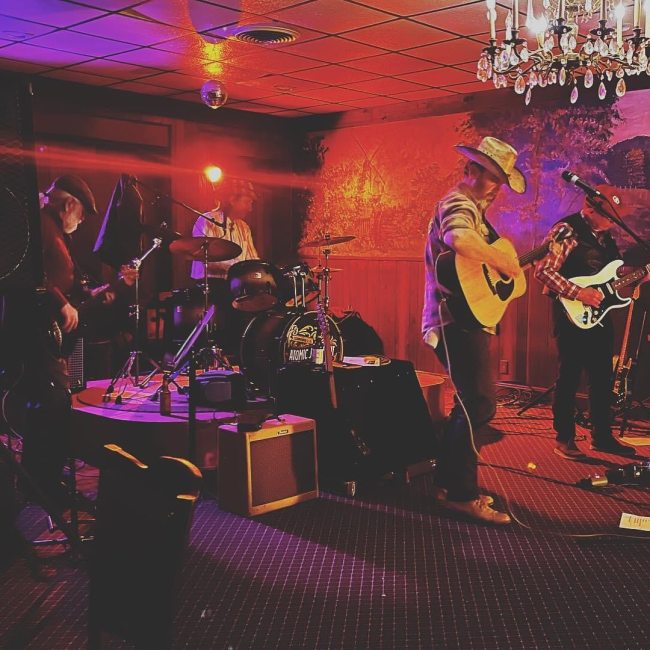
via Aaron Perlut
That realization hit like a kick in the nuts for the humor-focused band. What’s the point in trying to sing for laughs if it isn’t going to land?
But in hindsight, it might have been the best thing to happen.
As his musical confidence grew, so did his desire to write songs with real emotional depth. He focused on writing songs that he lived, or stories that felt authentic and resonated on a human level. What started as a playful concept transformed into something much more meaningful.
Alas, Atomic Junction was born.
A name that felt less like a punchline and more like a promise of the stories and emotions he was ready to explore with music.
The Unfiltered Truth About Touring
Atomic Junction recorded Peacedale in fall 2023. According to Aaron, it was a transformative experience. The band worked with producer Greg Griffith at his studio near Bristol, Connecticut, staying on-site for an intensive, four-day session. “Greg had a vision for what we could be,” Aaron recalls. “He pushed us, and we emerged better for it.” The album’s live feel and old-school cues have drawn comparisons to Lynyrd Skynyrd and Lou Reed.
This past summer, the band hit the road hard, promoting their new album, Peacedale. Based in St. Louis, they’ve played everywhere, from Texas to Arkansas, Tennessee, and Indiana. “It’s exhausting,” Aaron says, “but it’s also rewarding to introduce our music to new audiences.”
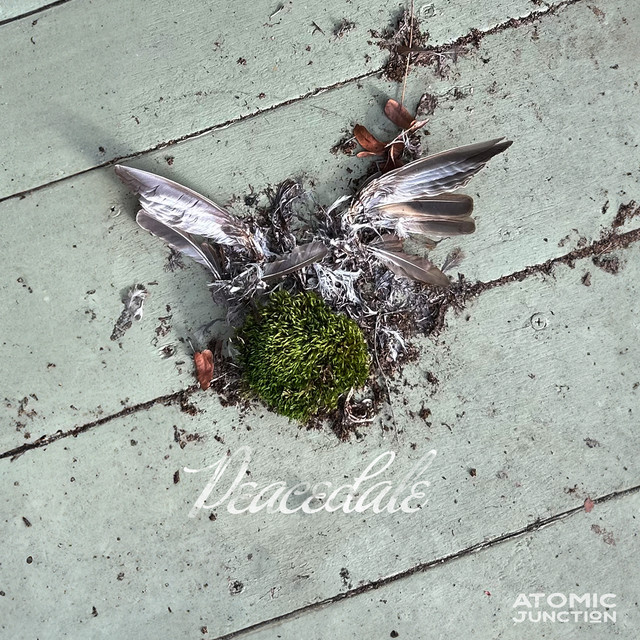
via Atomic Junction
Reception has been overwhelmingly positive—even from those who stumble upon their shows by chance. “Most people have no idea who we are when they walk in,” Aaron says. “But they leave with a sense of what we’re trying to do.”
Yet, the grind of touring—empty rooms, skeptical audiences, and earning respect from bartenders one gig at a time—is far from glamorous. He takes solace in the small wins, like a bartender’s unsolicited praise. “They’re the ones who’ll go talk to booking managers and say, ‘These guys are really good; we should have them back.’ It’s nice to get positive feedback, especially when I don’t even ask for it.”
Building an audience in St. Louis, however, has proven uniquely challenging. “People here expect you to be just another sh*tty bar band,” Aaron says. “We’re not that. We play largely original music by design.” He adds that the city’s dense market and the Americana niche the band occupies make it harder to stand out. “This is a cradle for the kind of music we play. There are so many bands in a similar space.”
Still, he remains optimistic. “It’s a crowded market, but we’re getting better every day. It’s about proving ourselves, one show at a time.”
Making Music That Tells Stories
Aaron’s story is as much about reinvention as it is about music. By day, he runs Elasticity, a full-service digital marketing agency in St. Louis. He’s also written marketing books like F!!CK Your Formula, a spicy takedown of cringeworthy growth hackers and icky thoughtfluencers. You know the type—the LinkedIn “brand strategists” and “creative ninjas” who clog your feed with jargon-laden posts about the grind or whatever mediocre publicity stunt captured some lame celebrity’s attention for a fleeting moment (barf).
Instead, Aaron champions a new playbook: less bullsh*t, more authenticity.
See, as a fellow hater of bullsh*t in digital media, stuff like that is why he’s my kind of guy.
That ethos defines his music, too. “The process of creating something—whether it’s an ad campaign or a song—is about connecting with people in a meaningful way,” Aaron says.
Atomic Junction’s songs are anchored in storytelling, a skill Aaron honed long before he picked up a guitar. Take “A Bar Toledo,” a standout track inspired by a Mob-connected nightclub in Ohio called the Peppermint Club. In the ’60s, it was a pop music haven; by the ’70s, it had become a country music dive so infamous that it allegedly inspired Kenny Rogers’ “Lucille.” Aaron wrote about it here on BroBible in 2022.
“I loved the story so much, I thought, ‘This needs to be a song,’” Aaron says. “If you hate reading, just listen to it—you’ll get the gist.”
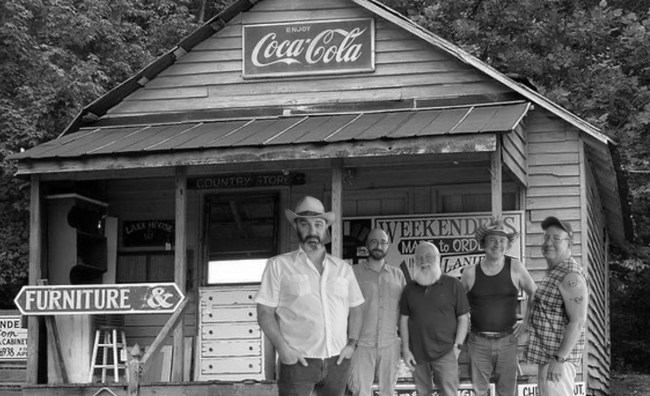
via Atomic Junction
Or consider “Gene the Auctioneer,” a track born from Aaron’s fascination with a teal blue hat he stumbled across in a realtor’s office. “It had this big rope across the brim and ‘Gene the Auctioneer’ embroidered on it,” he recalls. Naturally, Aaron spiraled into a rabbit hole, Googling the man’s backstory, unearthing photos, and even finding his obituary. “I didn’t know Gene, but I felt like I did after writing the song,” Aaron says.
This ability to transform forgotten histories and everyday oddities into layered, evocative songs sets Atomic Junction apart. “I’d be lying if I said I didn’t write tropes,” Aaron admits. “But a lot of it is autobiographical.” Case in point: “Now She’s My Ex”, a raw, confessional track about the pain Aaron’s drinking and alcoholism brought to his wife.
Rock ’n’ roll demands a story to tell. It also demands the guts to tell it—whether it’s about a Mob-run bar, a quirky teal hat, or the devil himself driving a bright red Prius.
“Know thyself” isn’t just wisdom from the Delphic Oracle—it’s the very soul that sees through the bullsh*t in rock ’n’ roll.
How Collaboration Is Rock ‘n Roll’s Secret Sauce
The spirit of collaboration is where the magic happens for Atomic Junction. “It’s like putting together a salad,” he says. “Each of us brings a unique flavor, and together, we create something greater.” I can’t decide if tossing salad is or isn’t a hilariously un-rock ‘n’ roll metaphor, sure—but you can’t argue with the point.
Despite positive reviews and some coveted playlist placements, Atomic Junction’s journey is still climbing uphill. Building a fanbase isn’t just about playing shows. It’s about convincing people to show up in the first place. And let’s face it: most of Aaron’s friends aren’t exactly hitting up live music venues like they did in their 20s. Ask anyone in their 40s and up how people grow out of that. In middle age, you learn how much juice you truly have in your social battery.
“I might lean on them once or twice a year for a big show,” Aaron admits. “But otherwise, it’s up to us to prove ourselves, one gig at a time.”
Aaron gets it. The grind is the grind. But for him, it’s not about overnight success or a breakout hit. It’s about the work—the songs, the stories, the connections. “At this point, I just want to make music that matters,” he says. “If people listen, that’s the reward.”
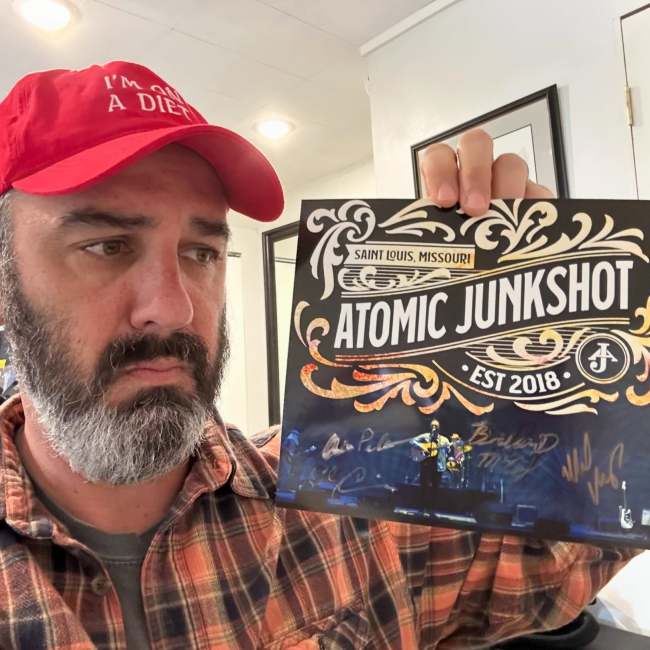
via Atomic Junction
Chasing What Makes You Feel Alive
Atomic Junction’s story isn’t a glossy, stadium-packed version of rock ‘n’ roll we’re sold in movies and antiqued VH1 documentaries. It’s messy. It’s sweaty. It’s driving hours around the Midwest to play a set for a dozen people, hoping one of them cares enough to come back or stream Peacedale on Spotify or buy a t-shirt so the band can justify the time commitment required to play more gigs.
But that’s the entire point! Chasing what makes you feel alive, even if you’re late to the party.
“As long as people are willing to listen, we’ll keep playing,” Aaron says.
And play his heart out, he does.

